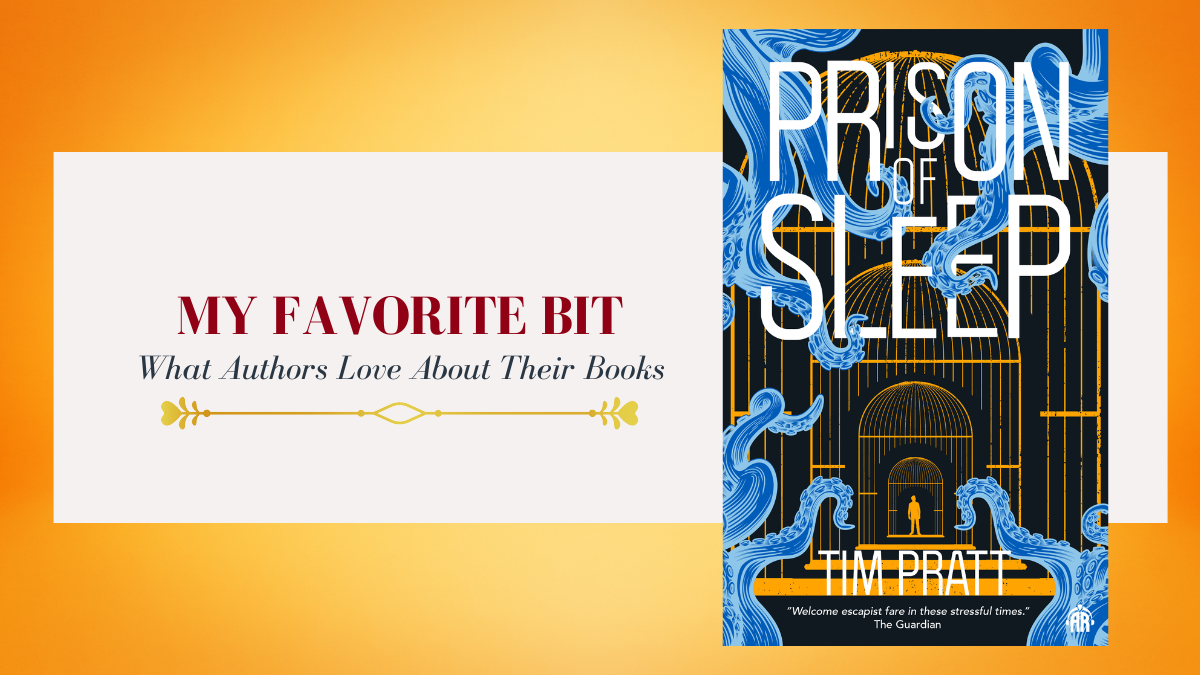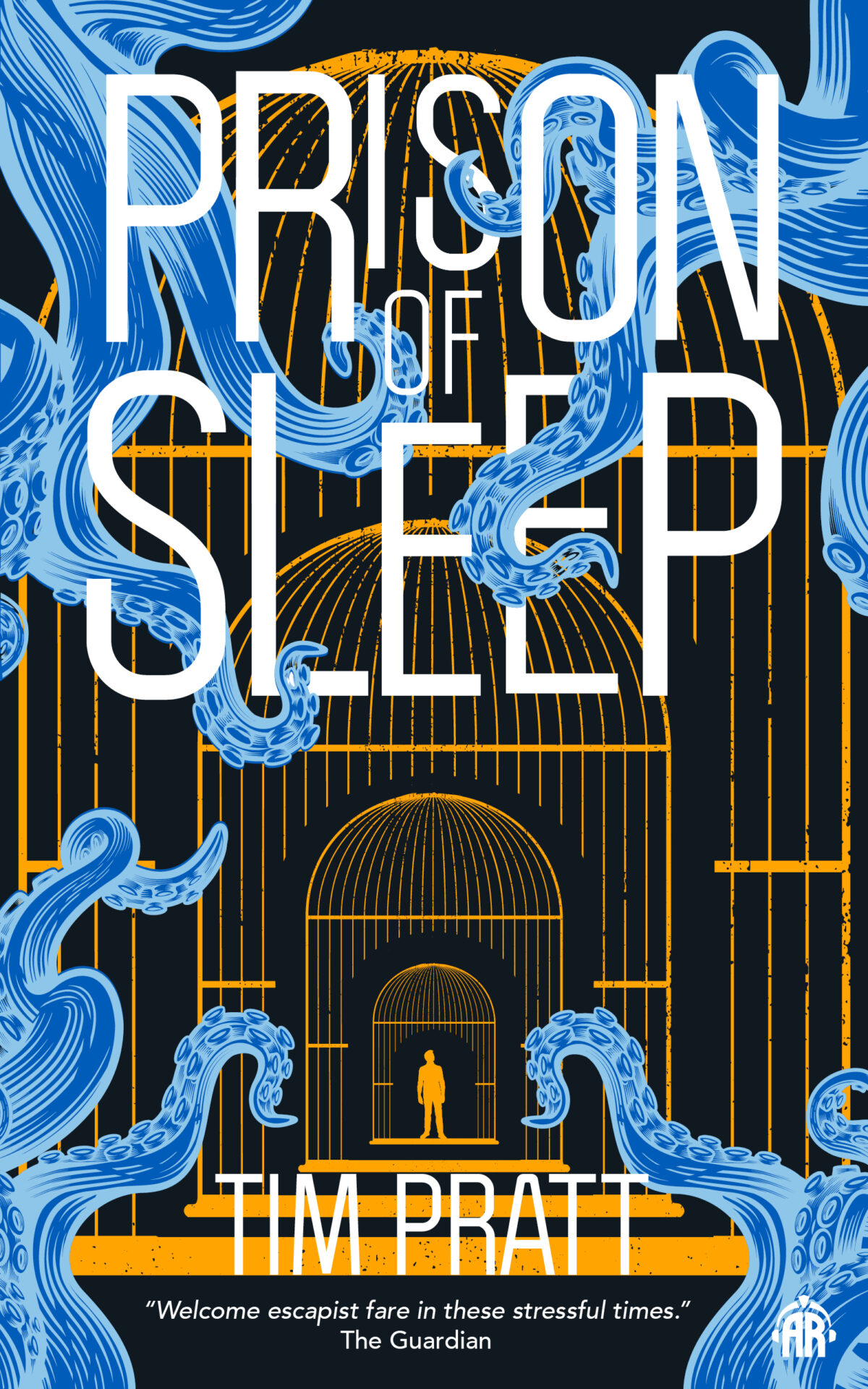
Tim Pratt is joining us today to talk about his novel, Prison of Sleep. Here’s the publisher’s description:
After escaping the ruthless Lector, Zax Delatree has a new enemy to fight in the sequel to Doors of Sleep.
Every time Zaxony Delatree falls asleep he wakes up on a new world. His life has turned into an endless series of brief encounters. But at least he and Minna, the one companion who has found a way of travelling with him, are no longer pursued by the psychotic and vengeful Lector.
But now Zax has been joined once again by Ana, a companion he thought left behind long ago. Ana is one of the Sleepers, a group of fellow travellers between worlds. Ana tells Zax that he is unknowingly host to a parasitic alien that exists partly in his blood and partly between dimensions. The chemical that the alien secretes is what allows Zax to travel. Every time he does, however, the parasite grows, damaging the fabric of the Universes. Anas is desperate to recruit Zax to her cause and stop the alien.
But there are others who are using the parasite, such as the cult who serve the Prisoner – an entity trapped in the dimension between universes. Every world is like a bar in its prison. The cult want to collapse all the bars of the worlds and free their god. Can Zax, Minna, Ana and the other Sleepers band together and stop them?
What’s Tim’s favorite bit?

TIM PRATT
My novel Prison of Sleep is the second book in a duology (after Doors of Sleep) so it’s pretty much impossible to talk about my favorite bit without at least some degree of spoileration. The basic premise of the series is that every time my protagonist Zax falls asleep, he wakes up in another world of the multiverse, and part of the fun is the delirious whirl through bizarre alternate realities.
In the second book, the integrity of the multiverse itself is threatened by the machinations of a cosmic entity known as the Prisoner, who dwells in the interstices between realities, surrounded by the cacophony of countless universes on all sides. The Prisoner wants to destroy all reality outside itself. (It’s got its reasons.)
Zax is an idealistic do-gooder who wants to see the best in everyone, and improve the lives of anyone he meets. The Prisoner is generally pretty friendly, but is not at all nice.
Putting the two of them together let me play with one of my absolute favorite tropes: the polite conversational sit-down with an affable villain. The exemplar of that, for me, is the iconic restaurant scene in the movie Heat, when Al Pacino’s cop sits down with Robert DeNiro’s career criminal and they talk through the essentials of their conflict and their respective life philosophies and eventually develop a grudging respect for one another. (The scene, just a few minutes long, is on YouTube: www.youtube.com/watch?v=LUy2Wx_r0_w&ab_channel=RobRash).
It’s so fun to write scenes like that: they explore character, they create a ton of tension, they set up a contrast to more contentious encounters later, and they give you an opportunity to unveil your themes and reveal the heart of your story’s philosophical conflict.
My favorite moment in Prison of Sleep comes when the Prisoner appears to Zax in a vision while Zax is asleep and transitioning between worlds (and, thus, present in the Prisoner’s liminal void).
Zax has been dealing with the Prisoner’s zealots and cultists, but it’s the first time the two of them have talked to one another directly, and the Prisoner does the classic villainous “We’re not so different, you and I” speech.
Zax wants to help people and alleviate suffering. The Prisoner says it has the same goal, but a much wider perspective. See, the Prisoner has looked around the multiverse, and found that most people in most universes are miserable to some degree or another. Wouldn’t they be better off freed from the pain of existence? The Prisoner says, “I want to make all the worlds a better place, Zaxony. I want to help people, and end suffering… just like you. I seek to provide the greatest good for the greatest number. To minimize suffering as much as possible. There are far too many worlds, Zax, with too many people in them. My solution is simple: destroy the walls of my prison.”
The Prisoner presents itself as basically an extreme Utilitarian philosopher — it wants the greatest good for the greatest number (or so it claims). The Prisoner accuses Zax of hypocrisy, because if he really wanted to end suffering on a meaningful scale, he’d join the Prisoner’s cause, and free everyone from even the possibility of pain.
Zax is not persuaded. (Granted, if he had been, he’d be kind of a monster; his reply is, “What you’re describing is so far beyond ordinary genocide there needs to be a new word for it.”) Zax is like the kid on the beach in the old story about the starfish. There are thousands of starfish washed up on the beach, drying out, and the kid picks them up one by one and throws them back in the water. The adults watching think it’s funny, and one says, “Why do you bother? You can’t possibly make a difference. There are too many.” But she just tosses another starfish in the water and says, “I made a difference for that one.” Having that “Chat with the Villain” scene let me get right to the heart of my main character’s worldview in an entertaining way, with some snark and tension in the mix. I could write scenes like that all day.
LINKS:
Prison of Sleep Universal Book Link
BIO:
Tim Pratt is a Hugo Award-winning SF and fantasy author, and has been a finalist for World Fantasy, Sturgeon, Stoker, Mythopoeic, and Nebula Awards, among others. He is the author of over twenty novels, most recently The Deep Woods and Heirs of Grace, and scores of short stories. His work has been reprinted in The Best American Short Stories, The Year’s Best Fantasy, The Mammoth Book of Best New Horror, and other nice places. Since 2001 he has worked for Locus, the magazine of the science fiction and fantasy field, where he currently serves as senior editor.
He lives in Berkeley, CA with his wife and son.
